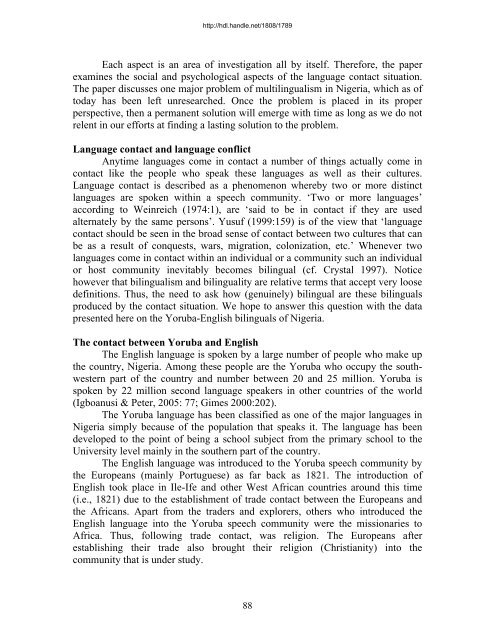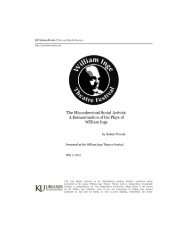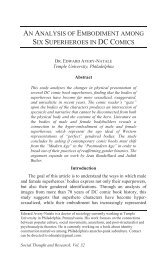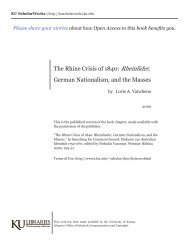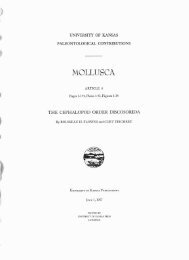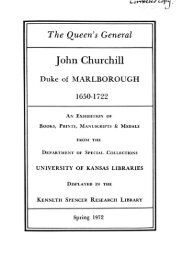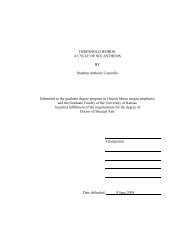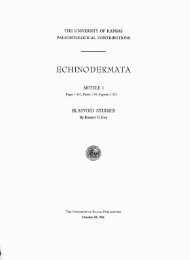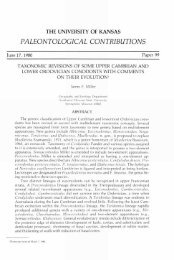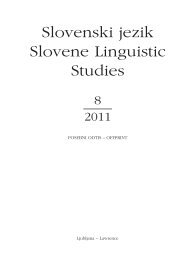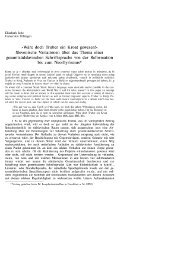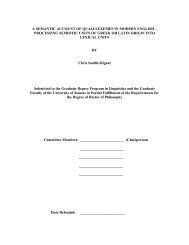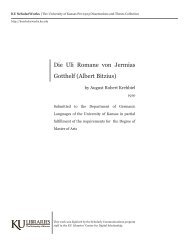LANGUAGE CONTACT AND LANGUAGE ... - KU ScholarWorks
LANGUAGE CONTACT AND LANGUAGE ... - KU ScholarWorks
LANGUAGE CONTACT AND LANGUAGE ... - KU ScholarWorks
Create successful ePaper yourself
Turn your PDF publications into a flip-book with our unique Google optimized e-Paper software.
http://hdl.handle.net/1808/1789<br />
Each aspect is an area of investigation all by itself. Therefore, the paper<br />
examines the social and psychological aspects of the language contact situation.<br />
The paper discusses one major problem of multilingualism in Nigeria, which as of<br />
today has been left unresearched. Once the problem is placed in its proper<br />
perspective, then a permanent solution will emerge with time as long as we do not<br />
relent in our efforts at finding a lasting solution to the problem.<br />
Language contact and language conflict<br />
Anytime languages come in contact a number of things actually come in<br />
contact like the people who speak these languages as well as their cultures.<br />
Language contact is described as a phenomenon whereby two or more distinct<br />
languages are spoken within a speech community. ‘Two or more languages’<br />
according to Weinreich (1974:1), are ‘said to be in contact if they are used<br />
alternately by the same persons’. Yusuf (1999:159) is of the view that ‘language<br />
contact should be seen in the broad sense of contact between two cultures that can<br />
be as a result of conquests, wars, migration, colonization, etc.’ Whenever two<br />
languages come in contact within an individual or a community such an individual<br />
or host community inevitably becomes bilingual (cf. Crystal 1997). Notice<br />
however that bilingualism and bilinguality are relative terms that accept very loose<br />
definitions. Thus, the need to ask how (genuinely) bilingual are these bilinguals<br />
produced by the contact situation. We hope to answer this question with the data<br />
presented here on the Yoruba-English bilinguals of Nigeria.<br />
The contact between Yoruba and English<br />
The English language is spoken by a large number of people who make up<br />
the country, Nigeria. Among these people are the Yoruba who occupy the southwestern<br />
part of the country and number between 20 and 25 million. Yoruba is<br />
spoken by 22 million second language speakers in other countries of the world<br />
(Igboanusi & Peter, 2005: 77; Gimes 2000:202).<br />
The Yoruba language has been classified as one of the major languages in<br />
Nigeria simply because of the population that speaks it. The language has been<br />
developed to the point of being a school subject from the primary school to the<br />
University level mainly in the southern part of the country.<br />
The English language was introduced to the Yoruba speech community by<br />
the Europeans (mainly Portuguese) as far back as 1821. The introduction of<br />
English took place in Ile-Ife and other West African countries around this time<br />
(i.e., 1821) due to the establishment of trade contact between the Europeans and<br />
the Africans. Apart from the traders and explorers, others who introduced the<br />
English language into the Yoruba speech community were the missionaries to<br />
Africa. Thus, following trade contact, was religion. The Europeans after<br />
establishing their trade also brought their religion (Christianity) into the<br />
community that is under study.<br />
88


